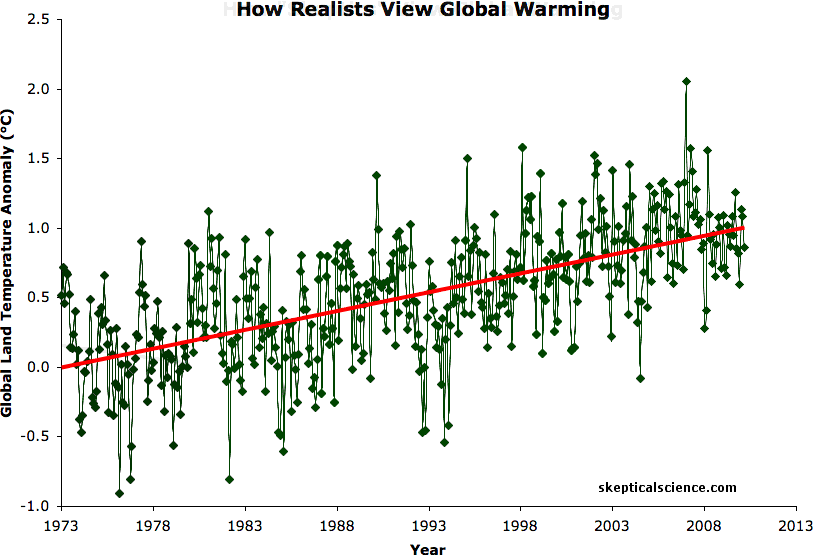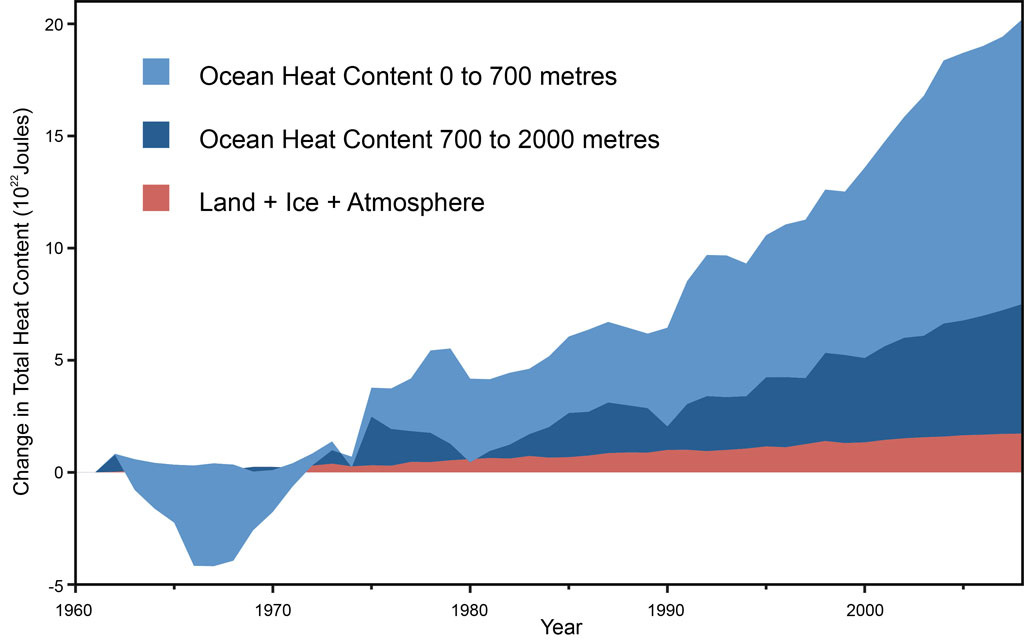
This post has also been re-published by The Guardian.
The British newspaper/tabloid The Dail Mail and its writer David Rose are notorious for publishing misleading (at best) climate-related articles, as we have discussed previously here, for example. They have recently struck again, claiming that according to a "quietly released" Met Office report, global warming stopped 16 years ago (a myth which Skeptical Science debunks here and here). This assertion is entirely fabricated, as the Met Office explained by publishing David Rose's inquiry and the Met Office's responses.
"Firstly, the Met Office has not issued a report on this issue. We can only assume the article is referring to the completion of work to update the HadCRUT4 global temperature dataset compiled by ourselves and the University of East Anglia’s Climate Research Unit.
We announced that this work was going on in March and it was finished this week. You can see the HadCRUT4 website here."
Rose's factually challenged article was predictably reproduced uncritically by the usual climate denial blogs and referenced by Fox News, perhaps in an attempt to distract from this year's record-breaking Arctic sea ice minimum. However, virtually every point made in the article was factually incorrect, as Rose would have known if he were a Skeptical Science reader, because we recently pre-bunked his piece.
Rose attempted to elicit a statement from the Met Office by asking a question which would be described in court as "leading the witness":
"First, please confirm that they do indeed reveal no warming trend since 1997."
The Skeptical Science temperature trend calculator can be used to test this question. The trend in the HadCRUT4 global surface temperature dataset since 1997 is 0.084 ± 0.152°C per decade (although we have not yet updated the HadCRUT4 data, the GISS and NCDC datasts show a similar warming trend since 1997). While the trend is not statistically significant, the central value is positive, meaning the average surface temperature has most likely warmed over this period.
The Met Office also explained that Rose is essentially trying to go down the up escalator (Figure 1) by focusing on short-term noise while ignoring the long-term trend.
"Over the last 140 years global surface temperatures have risen by about 0.8ºC. However, within this record there have been several periods lasting a decade or more during which temperatures have risen very slowly or cooled. The current period of reduced warming is not unprecedented and 15 year long periods are not unusual."
Figure 1: BEST land-only surface temperature data (green) with linear trends applied to the timeframes 1973 to 1980, 1980 to 1988, 1988 to 1995, 1995 to 2001, 1998 to 2005, 2002 to 2010 (blue), and 1973 to 2010 (red).
Perhaps most importantly, focusing on surface air temperatures misses more than 90% of the overall warming of the planet (Figure 2).
Figure 2: Components of global warming for the period 1993 to 2003 calculated from IPCC AR4 5.2.2.3.
Rose quotes Georgia Tech climate scientist Judith Curry (whose claims we have previously examined here and here) as asserting,
"The new data confirms the existence of a pause in global warming"
However, this claim is simply incorrect. Nuccitelli et al. (2012) considered the warming of the oceans (both shallow and deep), land, atmosphere, and ice, and showed that global warming has not slowed in recent years (Figure 3).
 Figure 3: Land, atmosphere, and ice heating (red), 0-700 meter OHC increase (light blue), 700-2,000 meter OHC increase (dark blue). From Nuccitelli et al. (2012).
Figure 3: Land, atmosphere, and ice heating (red), 0-700 meter OHC increase (light blue), 700-2,000 meter OHC increase (dark blue). From Nuccitelli et al. (2012).
Were Rose and Curry Skeptical Science readers, they would have known several days prior to the publication of this article that the claim about global warming "pausing" in 1997 was pre-bunked by Nuccitelli et al., as Figure 3 clearly shows.
Rose also quotes Curry as saying,
"Natural variability has been shown over the past two decades to have a magnitude that dominates the greenhouse warming effect"
This statement is also incorrect. There is always a point at which, as long as one only considers sufficiently short timeframes, a long-term signal will be smaller than the noise in the system, which appears to be Curry's argument here. However, for global surface temperatures, that timeframe is less than the two decades Curry specified in this quote.
Even ignoring 90+% of global warming and only considering global surface temperatures, they have warmed 0.4°C over the past two decades, according to HadCRUT4. Swanson et al. (2009) examined the role of natural variability on global surface temperatures and found that it rarely exceeds 0.2–0.3°C, and averages out to approximately zero over longer timeframes (Figure 4).
Figure 4: Estimation of the observed signature of internal variability in the observed 20th century global mean temperature in climate model simulations
Thus Curry is incorrect; even over a timeframe as short as the past two decades, the human-caused global surface warming signal has been larger than the natural variability of the global climate system. And when we consider the warming of the planet as a whole (including the oceans), the warming signal is very clearly larger than the noise over this timeframe, as Figure 3 shows.
Ultimately Rose elicits a quote from Curry to argue that climate models are exaggerating global warming:
"Professor Judith Curry...told The Mail on Sunday that it was clear that the computer models used to predict future warming were ‘deeply flawed’"
Rose and Curry are trying to argue that because global surface temperatures have not warmed as fast as the multi-model average in the IPCC report (0.2°C per decade), this somehow suggests the models are flawed. However, the Met Office explained to Rose (prior to the publication of his article) why this notion is incorrect.
"The models exhibit large variations in the rate of warming from year to year and over a decade, owing to climate variations such as ENSO, the Atlantic Multi-Decadal Oscillation and Pacific Decadal Oscillation. So in that sense, such a period is not unexpected. It is not uncommon in the simulations for these periods to last up to 15 years, but longer periods are unlikely."
Over the past decade, aerosol emissions (which cause cooling by blocking sunlight) have risen, solar activity has been low, there has been a preponderance of La Niña events (which also cause short-term surface cooling), and heat has accumulated in the deep oceans. Thus it is entirely unsurprising that these short-term effects all aligning in the cooling direction in recent years have offset much of the surface warming caused by human greenhouse gas emissions.
This result is in fact consistent with individual climate model runs. Meehl et al. (2011) showed that during "Hiatus Decades," there is less warming of the surface air and shallow oceans, and more warming of the deeper oceans (Figure 5), precisely as we have observed over the past decade.
Figure 5: Left: composite global linear trends for hiatus decades (red bars) and all other decades (green bars) for top of the atmosphere (TOA) net radiation (positive values denote net energy entering the system). Right: global ocean heat-content (HC) decadal trends (1023 Joules per decade) for the upper ocean (surface to 300 meters) and two deeper ocean layers (300 to 750 meters and 750 meters to the ocean floor), with error bars defined as +/- one standard error x1.86 to be consistent with a 5% significance level from a one-sided Student t-test. From Meehl et al. (2011)
All of these misleading claims lead to Rose's ultimate argument in attacking carbon pricing and investments in green energy.
"And with the country committed by Act of Parliament to reducing CO2 by 80 per cent by 2050, a project that will cost hundreds of billions, the news that the world has got no warmer for the past 16 years comes as something of a shock...the evidence is beginning to suggest that it may be happening much slower than the catastrophists have claimed – a conclusion with enormous policy implications."
On the contrary, the Earth has warmed as much as expected, and economic research has consistently shown that putting a price on carbon emissions will result in a net benefit to the economy (Figure 6). Pricing carbon emissions to account for the otherwise external costs of the damage they cause via climate change is 'Economics 101.'
Figure 6: Approximate costs of climate action (green) and inaction (red) in 2100 and 2200. Sources: German Institute for Economic Research and Watkiss et al. 2005
To sum up, Rose and Curry were simply incorrect in virtually every assertion made in this Daily Mail article.
Also see debunkings of the Rose Daily Mail piece by Climate Progress, Carbon Brief, Potholer, and Media Matters.
Posted by dana1981 on Wednesday, 17 October, 2012
 |
The Skeptical Science website by Skeptical Science is licensed under a Creative Commons Attribution 3.0 Unported License. |